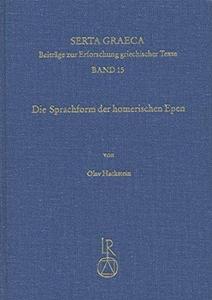
Free download скачать Die Sprachform der homerischen Epen: Faktoren morphologischer Variabilität in literarischen Frühformen: Traditionen, Sprachwandel, sprachliche Anachronismen By Hackstein, Olav
2002 | 351 Pages | ISBN: 3895003026 | PDF | 19 MB
One of the most salient characteristics of the Homeric language is its morphological variability. Ever since Witte and Parry, the meter and the formulaic diction have been believed to be the major factors conditioning the linguistic diversity of Homer's epics.While it has always been uncontroversial that the meter and the formulaic diction have a double-effect entailing both the preservation of linguistic archaisms and necessitating at the same time linguistic innovation with the employment of artificial and vernacular forms, it has rarely been asked let alone investigated whether additional factors can be held responsible for the linguistic diversity of Early Epic Greek. Prose texts in other languages and cultures may show an amount of morphological diversity comparable to that of Homer's epics and suggest that other factors than meter and formulaic diction may be at work generating a linguistic picture comparable to that offered by the Ilias and the Odyssey. Meter and formulaic diction need not be the only factors creating the surface symptom of morphological variability. Other factors include intra-linguistic processes (ongoing language change) and extra-linguistic stimuli (medial change). Most important among these is the beginning of literacy which always is characterized by a relative absence of language norms thus leaving more leeway for a freer combination of traditional (orally transmitted) language and contemporaneous vernacular language. The assumption that the poet(s) of the Homeric epics drew on the Ionic vernacular language is not entirely new; it has been hypothesized already by Witte and Parry. However none of these nor anybody else has attempted to identify the alleged traits of Ionic vernacular language in Homer's epics.Progress is however possible in light of new heuristic methods. As can be exemplified by many languages, vernacular forms frequently appear in the guise of "anachronisms", either as anticipatory anachronisms appearing later on in Ionic or as isolated (abortive) anachronisms passing from living use afterwards. Thenotion of the linguistic anachronism plays a central role in determining the vernacular Ionic variety of Greek posited by Parry. While such anachronistically "young" forms at first sight always seemed paradoxical and were athetized or emended in the course of textual edition, the paradox turns out to be a pseudo-paradox, once one realizes that the impression of an anachronism is created by the interweaving of two different but nonetheless synchronic varieties of Greek. Much of the seemingly anomalous forms can be real in Old Ionic and conform to well attested tendencies of the morphological development of Greek (remodelling of the ablaut system, thematization of athematic stems).In summary, the present work investigates the potential of the Homeric language to preserve archaisms and to exhibit linguistic innovation at the same time. It contains a new assessment of many difficult Homeric verb forms and thus purports to be a supplement to the treatment of the early epic Greek verb in PierreChantraine's Grammaire homérique (Tome I: Phonétique et morphologie. 5th corr. edition. Paris 1973). More generally, the monograph contains a typology of the interrelationship of social change and language change.
Buy Premium From My Links To Get Resumable Support,Max Speed & Support Me
FileFox
efrs6.rar
Rapidgator
efrs6.rar.html
Uploadgig
9c175905/efrs6.rar]efrs6.rar
Links are Interchangeable - Single Extraction

